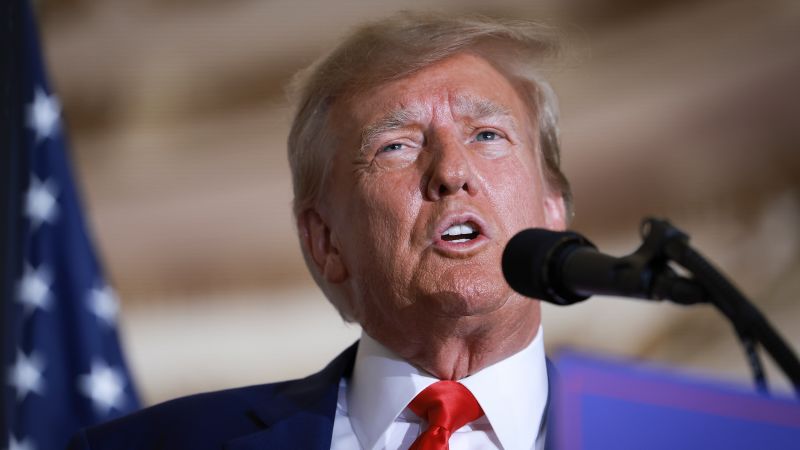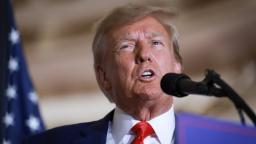

CNN
—
The defamation clash between Fox News and a small election services firm, due to go to trial this week, represents the most significant moment yet in which those who disseminated former President Donald Trump’s false claims that the 2020 election was stolen must answer for conduct that is still poisoning American democracy.
Dominion Voting Systems alleges the conservative network promulgated the ex-president’s conspiracy theories, including about its voting machines, to avoid alienating its viewers and for the good of its bottom line.
The trial had been scheduled to open Monday but the judge announced Sunday evening it’d be delayed until Tuesday. The reason was not immediately clear. But The Wall Street Journal, which is owned by Fox Corporation Chairman Rupert Murdoch, reported that Fox had made a late push to settle the dispute out of court, citing people familiar with the matter.
The drama expected to play out in a Delaware courtroom represents an extraordinary moment in modern American history because it could show how truth has been tarnished as a political currency and highlight a right-wing business model that depends on spinning an alternative reality. And yet, it remains unclear whether Trump – the primary author of the corrosive conspiracies that the 2020 election was fraudulent – will end up paying a significant personal or political price.
The idea that Trump’s claims – echoed by his aides and allies on Fox and sometimes by the channel’s personalities – had any merit will not even make it to first base in the trial. In one remarkable development during pre-trial hearings, presiding Superior Court Judge Eric Davis ruled that jurors did not even need to decide one key issue: whether Fox’s claims about Dominion were true.
“The evidence developed in this civil proceeding demonstrates that is CRYSTAL clear that none of the Statements relating to Dominion about the 2020 election are true,” Davis wrote, in a ruling last month that significantly narrowed the network’s avenues to mount a defense.
The epic case now turns on an attempt by Dominion to prove the legal standard for defamation that Fox must have known (or strongly suspected) it was lying about the issues at hand at the time and that it acted with “actual malice.”
Though he vigorously denies breaking any laws, the former president appears to face the possibility of indictment in probes into his attempt to overturn President Joe Biden’s election victory by a district attorney in Georgia and by special counsel Jack Smith into his conduct in the lead-up to the US Capitol insurrection. And the many layers of Trump’s democracy-damaging behavior were catalogued in interviews and public testimony taken by a House select committee when Democrats controlled the chamber last year.
But the falsehood of a corrupt election still forms the bedrock of Trump’s 2024 campaign to win back the White House. Millions of Trump’s supporters have bought into the idea that he was illegally ejected from office on the premise that he really won in 2020.
It’s also questionable whether viewers of conservative media will hear much about the trial and get sufficient information that might convince them to change their minds about 2020.
Trump’s insistence that the election was stained by fraud is giving some senior Republicans nightmares as they try to rebound from his loss in 2020 and work through their disappointment at the lack of a “red wave” in the last year’s midterms, despite winning the House.
As Georgia GOP Gov. Brian Kemp put it on CNN’s “State of the Union” Sunday, the ex-president is forcing his party to keep looking in the rearview mirror and hampering its effort to look to the future.
One core argument in court will likely be trying to show that Fox believed that telling the audience inconvenient truths was bad for business – a factor that drove right-wing media in 2020 and still holds true today. Proof of this can be seen in the way the Republican Party remains unwilling to anger its base voters two years on. While many top party leaders have signaled they want to move on from Trump, the only part of the GOP that has power in Washington – the House Republican majority – has made repeated efforts to shield Trump from accountability over the 2020 election and to distort what actually happened on January 6, 2021.
But the court proceeding against Fox – like the constitutional process that assured a transfer of power between Trump and Biden, albeit one marred by violence – shows that the country’s instruments of accountability remain intact, despite Trump’s efforts.
Fox News and its parent company, Fox Corporation, deny wrongdoing. They’ve argued that their conspiracy theory-filled broadcasts after the 2020 election were protected by the First Amendment and that a loss in the case would be a devastating blow to press freedoms.
But the run-up to the trial has been a catalog of embarrassments and reversals for both the network and the broader premise that there is anything to Trump’s false claims.
The judge, for instance, observed last week in pre-trial hearings that there were well established and accepted limits on First Amendment rights.
“To go up there and say, ‘What Fox did was protected by the First Amendment,’ it’s half the story. It’s protected by the First Amendment if you can’t demonstrate actual malice,” he said.
Texts and emails between Fox personalities and managers, and depositions released by Dominion, suggest that privately, some at the channel dismissed Trump’s claims but amplified them amid growing fears that telling the truth might force viewers to turn elsewhere.
For example, Murdoch emailed Fox News CEO Suzanne Scott telling her that rival conservative network Newsmax needed to be “watched.” In another message, Fox anchor Tucker Carlson told his colleague Laura Ingraham, “Our viewers are good people and they believe [the election fraud claims].”
Fox has accused Dominion of cherry picking damaging quotes and texts ahead of the trial. But the evidence that has emerged suggests that Fox’s desire to cater to the beliefs of its viewers, even with untrue information, is closely allied to Trump’s own approach and reflects the way in which the Republican Party has been loath to antagonize the ex-president’s supporters.
From the opening hours of his presidency, Trump made clear he would create an alternative vision of reality that his supporters could embrace and that would help him subvert the rules and conventions of the presidency. The angry exhortations by Trump’s first press secretary, Sean Spicer, in January 2017 that his boss had attracted the biggest inauguration crowd in history seemed at the time bizarre and absurd. But in retrospect, they were the first sign of a daily effort to destroy truth for Trump’s political benefit, which eventually morphed into lies about a stolen election that convinced many of the ex-president’s supporters. The culmination of all this was the mob attack by his supporters on Congress on January 6, 2021, during the certification of Biden’s victory.
The idea that the Fox defamation trial might actually play a role in purging lies about the 2020 election seems far-fetched because the power of his falsehoods has survived many previous collisions with the truth. Although multiple courts in multiple states threw out Trump’s cases alleging election fraud after the 2020 election, the idea that the election was stolen still undermined faith in American democracy among his supporters. Only 29% of Republicans in a CNN/SSRS poll published in July 2022 had confidence that US elections truly represent the will of the people.
This is, perhaps, not surprising. Because when he was in office, Trump made no secret of his strategy, telling the world in a moment of candor how he operated.
“Stick with us. Don’t believe the crap you see from these people, the fake news,” he said in a directive to his supporters at a Veterans of Foreign Wars convention in Kansas City in 2018. “What you’re seeing and what you’re reading is not what’s happening.”
Five years on, Trump is still at it.
“We won in 2016. We won by much more in 2020 but it was rigged,” Trump said in the first big rally of his campaign in Waco, Texas, at the end of March.
The fact that Trump continues to spread such falsehoods – and that many in the Republican Party remain unwilling to challenge him – irks some party leaders who watched as Trump’s handpicked candidates, who touted his election lies as the price of his endorsement, flamed out in swing states in last year’s midterm elections.
Georgia’s Kemp warned, for example, that constantly bringing up 2020 would create another political disaster for his party.
“I think any candidate, to be able to win, is to talk about what we’re for, focus on the future, not look in the rearview mirror,” Kemp told CNN’s Jake Tapper on Sunday.
“If you look in the rearview mirror too long while you’re driving, you’re going to look up, and you’re going to be running into somebody, and that’s not going to be good.”
Yet the fact that Trump, according to many polls, remains the front-runner for the Republican nomination in 2024 and is still wildly popular with conservative grassroots voters suggests that it will take far more than a courtroom display to restore the truth about 2020.
And the GOP will likely be looking in the rearview mirror for some time to come.
